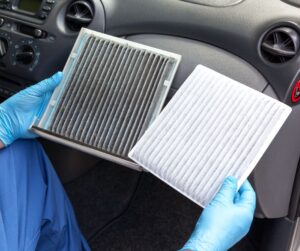Winterizing Your Windshield & Headlights for Visibility
 Rain, fog, ice, dust – nature’s elements can impair visibility while driving – regardless of the time of year. In the winter, though, we may notice the condition of our windshields, wipers, and headlights more than any other season. Dust, grime, and moisture can build up in our headlights, reducing our ability to see and be seen. Likewise, ice damage on windshields and wipers can also cause a hazard. At Tommy’s Automotive, we are committed to your – and your family’s – safety.
Rain, fog, ice, dust – nature’s elements can impair visibility while driving – regardless of the time of year. In the winter, though, we may notice the condition of our windshields, wipers, and headlights more than any other season. Dust, grime, and moisture can build up in our headlights, reducing our ability to see and be seen. Likewise, ice damage on windshields and wipers can also cause a hazard. At Tommy’s Automotive, we are committed to your – and your family’s – safety.
Keep Your Windshield Clear and Protected
During the winter months, windshields take a beating from ice, snow, and road salt. To maintain visibility and prevent damage, follow these simple tips:
- Use a High-Quality Windshield Washer Fluid – Standard washer fluid may freeze in cold temperatures, leaving you stranded with a dirty windshield. Switch to a winter formula that’s designed to withstand freezing conditions.
- Replace Old Wiper Blades – Worn-out wipers won’t effectively clear snow, ice, or grime from your windshield. If you notice streaking or skipping, it’s time for a replacement. Consider winter-specific blades designed to handle icy conditions.
- Prevent Ice Buildup with a Windshield Cover – If you park outside overnight, a windshield cover can prevent ice from forming, saving you time (and frustration) in the morning.
- Defrost Properly – Blasting hot air onto an icy windshield can cause cracks. Instead, turn on the defroster gradually and let the glass warm up slowly.
Protect Your Headlights for Maximum Visibility

- Clean Your Headlights Regularly – Road salt, slush, and dirt build up quickly in the winter, reducing brightness. Use a headlight cleaning solution or even a simple mix of baking soda and water to remove grime.
- Check for Moisture Inside the Headlight Housing – Foggy or hazy headlights can mean condensation is trapped inside. This can reduce light output and cause long-term damage. If you notice moisture, have your headlights inspected and sealed.
- Upgrade to Brighter Bulbs – If your headlights seem dim, consider replacing old bulbs with new halogen or LED bulbs for better illumination.
- Adjust Headlight Alignment – Over time, headlights can become misaligned, reducing visibility. If you notice uneven lighting, bring them to our team at Tommy’s for an adjustment.
Don’t Forget Your Rear and Side Windows
While your windshield and headlights get the most attention, don’t neglect your other windows.
- Use an Anti-Fog Spray on Interior Glass – Condensation can quickly fog up windows in cold weather. Anti-fog sprays help maintain clarity.
- Keep Side Mirrors Ice-Free – If your mirrors tend to freeze over, apply a thin layer of shaving cream or rubbing alcohol to prevent ice buildup.
Stay Safe with Routine Maintenance
Winter visibility isn’t just about cleaning and defrosting—it’s also about ensuring your vehicle is in top condition. At Tommy’s Automotive, we offer inspections, repair, and maintenance services to help you stay safe on the road all season long.
If you need new wipers, a headlight restoration, or a windshield check-up, stop by our shop. We’re here to make sure you see (and are seen) clearly this winter! Schedule your service today.

 Whether your college student is off to West Chester University, Chester County CC, or another nearby university, one of your top priorities is ensuring your child’s safety, both on and off campus. While your student may be excited about the newfound freedom of driving, it’s crucial to ensure they possess the knowledge and skills to maintain their vehicle properly. Teaching your college drivers about car maintenance not only helps them stay safe but also saves money and fosters responsible driving habits.
Whether your college student is off to West Chester University, Chester County CC, or another nearby university, one of your top priorities is ensuring your child’s safety, both on and off campus. While your student may be excited about the newfound freedom of driving, it’s crucial to ensure they possess the knowledge and skills to maintain their vehicle properly. Teaching your college drivers about car maintenance not only helps them stay safe but also saves money and fosters responsible driving habits. Budgeting for Car Maintenance
Budgeting for Car Maintenance Temperatures are heating up and one of the best ways to escape the heat is by taking a drive. Whether you set off to the beach, a nearby tourist destination, or you decide you want to spend some time in an air-conditioned car – a summer drive can be the refresh you need. Before you gas up and hit the road, there are some summer driving tips to consider.
Temperatures are heating up and one of the best ways to escape the heat is by taking a drive. Whether you set off to the beach, a nearby tourist destination, or you decide you want to spend some time in an air-conditioned car – a summer drive can be the refresh you need. Before you gas up and hit the road, there are some summer driving tips to consider. Coming out of a winter where temperatures can frequently dip below freezing, you may be wondering whether or not your car’s battery is going to need replacing. While the average car battery lasts anywhere from 3 to 5 years, many factors contribute to its lifespan. At Tommy’s Automotive, we routinely check our customer’s car batteries and can recommend replacement based on a few things.
Coming out of a winter where temperatures can frequently dip below freezing, you may be wondering whether or not your car’s battery is going to need replacing. While the average car battery lasts anywhere from 3 to 5 years, many factors contribute to its lifespan. At Tommy’s Automotive, we routinely check our customer’s car batteries and can recommend replacement based on a few things. Winter may be one of the most important times to stay on top of vehicle maintenance. Cold weather can be hard on vehicles, so making sure your oil is changed, the gas tank is full, and your tires are in excellent shape can help you stay safe on winter roads. Inspecting the tire pressure and tread regularly will ensure your safety and keep your vehicle’s health in check.
Winter may be one of the most important times to stay on top of vehicle maintenance. Cold weather can be hard on vehicles, so making sure your oil is changed, the gas tank is full, and your tires are in excellent shape can help you stay safe on winter roads. Inspecting the tire pressure and tread regularly will ensure your safety and keep your vehicle’s health in check. As gas prices continue to climb, many of us are feeling the pain at the pump. While no one can say when the fuel costs will go down, there are some great ways you can save some money and get better fuel economy – no matter what vehicle you drive.
As gas prices continue to climb, many of us are feeling the pain at the pump. While no one can say when the fuel costs will go down, there are some great ways you can save some money and get better fuel economy – no matter what vehicle you drive. Oh, Canada! No, we aren’t singing their anthem . . . but we are breathing in their air, and that hasn’t been a good thing. If you have noticed the increase of smokey days around Pennsylvania this summer, we can thank our neighbors to the north. While you may feel you can breathe easy indoors or in your car as long as the windows are up, you would be wrong. When smoke particles in the atmosphere increase, breathing them in can cause a lot of health damage. That is why using HEPA filters in your homes and cars is critical.
Oh, Canada! No, we aren’t singing their anthem . . . but we are breathing in their air, and that hasn’t been a good thing. If you have noticed the increase of smokey days around Pennsylvania this summer, we can thank our neighbors to the north. While you may feel you can breathe easy indoors or in your car as long as the windows are up, you would be wrong. When smoke particles in the atmosphere increase, breathing them in can cause a lot of health damage. That is why using HEPA filters in your homes and cars is critical. As the colors start to change all across Pennsylvania, a new danger may be lurking around the corner for many drivers. In our area, deer are aplenty. Not only do they blend in with the fall colors, but deer have a tendency to jump out in front of vehicles when they get startled. In addition, if they are running from predators they can come out of nowhere, even for the most attentive drivers.
As the colors start to change all across Pennsylvania, a new danger may be lurking around the corner for many drivers. In our area, deer are aplenty. Not only do they blend in with the fall colors, but deer have a tendency to jump out in front of vehicles when they get startled. In addition, if they are running from predators they can come out of nowhere, even for the most attentive drivers. Shawn T Wagner, our friend and coworker here at Tommy’s Automotive, unexpectedly passed away July 11th, 2022 in a tragic boating accident. Shawn was with the company for 10 years and a friend long before that. He would do anything to help a friend and was the type of guy that would stop to change a flat tire for a stranger in the rain.
Shawn T Wagner, our friend and coworker here at Tommy’s Automotive, unexpectedly passed away July 11th, 2022 in a tragic boating accident. Shawn was with the company for 10 years and a friend long before that. He would do anything to help a friend and was the type of guy that would stop to change a flat tire for a stranger in the rain. It can be one of the most miserable experiences in a person’s life . . . dealing with a dead battery on the side of the road in frigid temperatures. As cold temperatures set in, it is crucial to inspect your battery before you end up in that situation. If you have a dead battery, your vehicle will not start. This can happen because of cold weather or a battery that is worn out. Because a battery is such a simple part of your car, it is easy to forget this vital inspection when cold weather sets in.
It can be one of the most miserable experiences in a person’s life . . . dealing with a dead battery on the side of the road in frigid temperatures. As cold temperatures set in, it is crucial to inspect your battery before you end up in that situation. If you have a dead battery, your vehicle will not start. This can happen because of cold weather or a battery that is worn out. Because a battery is such a simple part of your car, it is easy to forget this vital inspection when cold weather sets in.